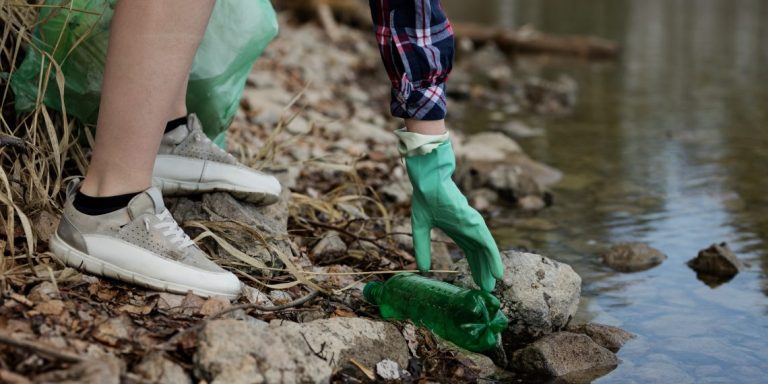Look past the media hype around bioplastics and it’s difficult to know where to really start. What is a bioplastic? What is biodegradability? Are bioplastics ready for the mainstream? These may seem like innocuous questions, but the reality is not so straightforward. Here, Jonathan Wilkins, director at industrial parts supplier EU Automation, sheds light on what manufacturers should really know before embracing bioplastics.
Back in October 2018, following days of stormy weather and rough seas on the UK coastline, Brean Beach, in Burnham, Somerset was left littered with rubbish washed up with the tide. While this wasn’t exceptional — marine debris is often deposited on the beach following a storm — when one of the Burnham Coastguard Rescue Team posted a picture on Facebook of an old plastic bottle they’d found on the beach, it sparked a wider debate around plastic pollution.
You see, the bottle wasn’t any old bottle. It was a bottle of Fairy washing-up liquid from at least 1971. What’s more, the bottle was in pristine condition despite having weathered the seas for nearly fifty years. When you consider the fact that a typical plastic bottle can take up to 450 years to decompose in the ocean, and that 12.7 million tonnes of plastic seeps into our oceans every year, it’s clear to see why the incident struck a chord with so many people on social media.
Biodegradable or bioplastic?
While the terms bioplastic and biodegradable plastic have been widely used, they are somewhat of a misnomer. Bioplastics, as the name suggests, are plastics made entirely, or in part, from organic, naturally occurring feedstocks. Biodegradable plastics, on the other hand, are plastics that can be broken down naturally by microorganisms to accepted industry standards.
However, this is where we need to do some myth-busting. While all biodegradable plastics are bioplastics, not all bioplastics are biodegradable. Take Coca-Cola’s PlantBottle, for example, which is partly plant-based. The bottle is made from polyethylene terephthalate (PET), created through the polymerisation of a mixture of organic and petrochemical-based compounds. So, while it can be called a bioplastic owing to its bio-based feedstock, it will never biologically break down.
This is not to say that bioplastics made entirely from plant-based compounds don’t exist. In recent years, we’ve seen the rise of bioplastics made from starches derived from corn and sugar cane, that are converted into polylactic acid (PLA), a type of plastic that is becoming popular for food packaging and other single-use plastics.
It’s important to note that while entirely plant-based bioplastics are biodegradable, they are not necessarily all compostable at home. This brings us onto our second misnomer: biodegradability. Although bioplastics may biodegrade in industrial composters that offer the high levels of heat, pressure, pH and microbial environment necessary for degradation, these conditions are rarely, if ever, present in the natural world. This means that even bioplastics derived from entirely natural sources, may still never break down in the sea.
What this means for industry
As a manufacturer, you may be considering playing your part in tackling the plastic crisis by addressing the use of plastics in your products or in the parts you use in your manufacturing operations. Bioplastics may seem like a tempting option, but if they’re no better for the environment, it may not be worth the cost of adapting your infrastructure to adopt them.
Breakthroughs in bioplastics are happening as we speak. For example, biopolymer specialist Teysha Technologies has developed a bioplastic whose properties can be tuned to break down in the natural environment shortly after entering the sea.
Professor Karen L. Wooley, inventor and CTO at Teysha explains: “Over the past couple of decades, we’ve become keenly aware of the potential negative impacts that may occur for polymer materials that persist beyond their useful lifetime. This has led us to consider the full lifecycle of plastics at the initial design stage.
“A significant advantage of our technology is the use of natural, sustainable feedstocks to generate polycarbonate materials with the ability to tune the physical, mechanical and chemical properties by controlling the chemistry, formulation and polymerization conditions.
“The strength, toughness, durability and longevity of our polymers are dependent on the properties of the specific monomers used in polymerization and can be tuned for various applications. Our material properties range from flexible to rigid, with degradation occurring over a period of weeks to years, depending on the polymer composition and the environmental conditions.
“The main mechanism of polymer degradation is through hydrolytic degradation, allowing for breakdown in any environment containing moisture and does not require microbial activity, anaerobic conditions or industrial composting.”
Managing obsolescence
Truly flexible biopolymers may still be years from commercialisation. In the meantime, if obsolescence management is your priority, then using industrial parts made from existing plastics may offer a way of extending the useful lifetime of the part in question. Even after they break, these parts can be repaired, refurbished and returned to operational use. This philosophy or repair, reuse, recycle should continue even once more viable bioplastics enter the marketplace.
It seems that embracing bioplastics is not as straightforward as it first seems. For those in industry, understanding the mechanics of materials will go a long way in allowing manufacturers to embrace not just bioplastics, but engaging with materials more sustainably altogether.
Link to the original article – https://www.memuk.org/manufacturing/composites-plastics/why-manufacturers-should-really-know-what-it-means-to-embrace-bioplastics-52672



